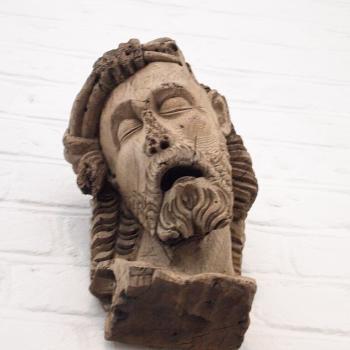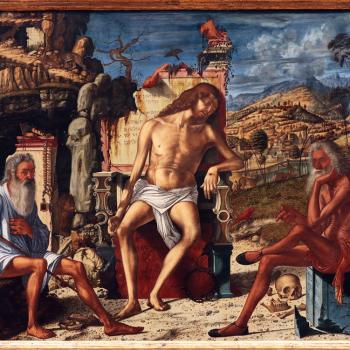
St. Therese of Lisieux, as many of her letters show, questioned the way things worked in life. There is way too much suffering in life. People, even when they knew what they should be doing, found things were put in their way, preventing them from doing what they should, causing great amounts of stress and anxiety as a result. This was especially true for her during the time she was trying to be accepted as a nun. And yet, despite the way her life was going, despite the grief she felt, she never lost a sense of the joy which she also had in her, the joy that Jesus gave to her. She could, like all of us, complain about her pain and sorrows, and ask why she had them. And she did with a great sense of innocence, something which many of us do not have when we ask those questions later in life. She accepted that life could be and would be filled with sacrifices. While she wondered why, she did not let them detour her from her faith. Like Job, Jeremiah, and many others righteous men and women, she knew it was not wrong to ask God why. She knew it was not wrong to try to figure out an answer. And this is what theologians have tried to do throughout the centuries, each giving their own answers, some better than others, but none which completely satisfies our confusion. St. Therese wanted a better answer than all those which she had been told. We can see this in her letters. She talked about the burdens of life. We can see her confusion about all she had to go through in order to become a nun, with all the pain and sorrow it brought. But we can also see, despite it all, she did not lose faith, either in Jesus, or in her own vocation. She just wanted to know why, as her letter to Celine indicated:
Life is burdensome. What bitterness … but what sweetness. Yes, life is painful for us. It is hard to begin a day of work. The feeble bud has seen it just as the beautiful lily has. If we feel Jesus present, oh! Then we would really do all for Him, but no, He seems a thousand leagues away. We are all alone with ourselves. Oh! What annoying company when Jesus is not there. But what is this sweet Friend doing then? Doesn’t He see our anguish, the weight that is oppressing us? Where is He? Why does He come to console us since we have Him alone for a friend? Alas, he is not far; He is there, very close. He is looking at us, and He is begging this sorrow, this agony from us. He needs it for soul and for our soul. He wants to give us such a beautiful recompense, and His ambitions are very great. [1]
Behind her response, behind all her piety and joy, we see a young woman experiencing various pains and sorrows in life. She experienced much grief. She knew, like all of us, that life can be burdensome. Life can be said to be filled with suffering, as Siddhartha would say, and yet, even with all that suffering, there is more to it than suffering. We experience many joys in life. We receive all kinds of graces, showing what it is life should be about. We are meant to thrive. We are meant to experience love. We can experience it all. The key is to find the path, to find the way, to properly navigate our lives so that we can and should do what will help us move beyond such suffering and receive more and more of the love and grace which can and will bring an end to all our anxiety and grief. And this, she saw, Jesus helped her do. She knew Jesus was bringing her much consolation and joy, when she experienced his presence in her life. But that led her to question why she didn’t always do so. Why did he not always seem to be around? Why can’t he always be there so we don’t have to face all our bitterness and pain all alone? Even though she couldn’t give a complete answer, she knew that it had to include what theologians said, which is, though Jesus often seems distant, he never is – he is always there with us even if we are not aware of him. He is always there, working for us, taking our pain and sorrow upon himself. The bitter poison of sin needs to be revealed. It needs to be exposed, and that, combined with the poison itself, is the source of much of our pain and sorrow. For, to expose it, Jesus needs, as it were, to operate on us, cutting us open to find it and draw it out. Then he can take it away. But, as he operates open us, we feel some pain, though we also find, with the joy his grace and love gives us, some of the pain has been numbed, and it could be (and often is) much worse (when we resist him).
For Therese, much of her pain came from her need to learn patience. She knew her calling and she wanted to fulfill it at an age which it was not usually permitted. She was called to the religious life, to be a Carmelite, but she was being told to wait until she was older. She didn’t want to wait. She did all she could do to be accepted as a novice at an age far earlier than usual. And, as she believed it was what Jesus wanted from her, she had faith that he was going to help her attain her goal:
My little boat is having much trouble reaching port. For a long time, I have seen the shore and I always find myself far off; but it is Jesus who is guiding my little boat, and I am sure that on the day when He wills it, it will be able to approach the port safely. O Pauline, when Jesus will have place me on the blessed shore of Carmel, I want to give myself totally to Him, I want to live no longer but for Him. Oh, no, I shall not fear His strikes, for, even in the most bitter sufferings, I always feel that it is His gentle hand that is striking. I really felt this at Rome at the very moment when I would have believed the earth could have given way beneath my steps.[2]
We should, likewise, understand our life similarly. We are not all going to be like Therese. We are not all called to religious life. We are not going to be called to do extraordinary things at a young age. But we are all called to have a life with Jesus, a life with God. We are called to do what we can to strengthen our bond to him so that we can find him at work in our life, helping us, healing us from within and without from the poison of sin. There will be pain and sorrow. We will wonder why it is so. Even when we acknowledge we have often done things which we should not have done, things which we are not surprised causes us pain and sorrow, we still find our grievances come from those pains and sorrows which seem to come out of nowhere, and have no connection to what we have done. And they are what lead us to question God and the way things are in the world. We might know, in theory, it can be for our own good. We might, in theory, recognize it is a way for God’s grace to work in us, to heal us from all kinds of spiritual poisons. We might recognize it. But we can still wonder why. We can still question what is going on in our lives. We can ask why life can be said to be about so much suffering. St. Therese shows us it is fine to ask such questions. St. Therese, so filled with joy, St. Therese, with her simple, loving heart, still wondered why. It is fine to wonder. It is fine to question. What we should not do is try to create definitive answers, for when we do, then, like the friends of Job, we will end up saying things which not only are false, but hurtful.
[1] St. Therese of Lisieux, The Letters of St. Therese of Lisieux. Volume 1: 1877-1890. Trans. John Clarke, OCD (Washington, DC: Institute of Carmelite Studies, 1982), 449-50 [July 23, 1888 to Celine].
[2] St. Therese of Lisieux, The Letters of St. Therese of Lisieux. Volume 1: 1877-1890., 400 [March 18, 1888 to Sister Agnes of Jesus].













